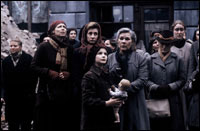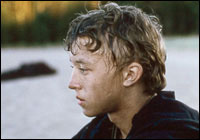 |
|
|
|
The documentary form is alive and well.
It is particularly heartening to see big American directors
take on hot political themes such as Palestine and cast a
critical eye over Americas current role in the world. What
the Mostra also reveals is that we are still haunted by the
Holocaust (Rosenstrasse, Pornografia) and tormented
the Israeli-Arab conflict (Le Cerf-Volant, Persona
Non Grata, La Guerra). Venice is an elegant showcase for world
cinema. With several interesting and compelling films from
Russia, China, Japan, Italy and Lebanon, the 2003 Mostra offered
an abundant, varied and intriguing selection. But the varying
quality of some narrative films also provided a schizophrenic
and an even amusing effect. After the disasters of Imagining
Argentina- jeered by the Mostra audience- and 29 Palms,
a pointless, utterly pretentious and ultra-violent study of
violence by Bruno Dumont, Lost in translation, a film
by Sofia Coppola brimming with intelligent humour, and Takeshi
Kitanos sword drama Zatoichi, particularly extroverted in
terms of stylistic expression, restored our faith in the joys
of cinema. These films project the pleasure of film-making.
There was also star power in evidence at the Mostra. Promoting
Intolerable cruelty, the Coen Brothers latest effort,
a screwball romantic comedy which exhibits little of their
surreal wit, George Clooney and Catherine Zeta-Jones- possibly
the most beautiful contemporary screen couple- brought a classic
Hollywood glamour to Venice. To the disappointment of fans
of the more provocative and enigmatic Buongiorno, notte,
The Golden Lion was ultimately awarded to the the beautiful
Russian film Vozvraschenie (The Return). Although it has a
classical form and narrative-the refined production values
of this outstanding debut film by Andre Zvyagintzev are particularly
impressive- The Return was not, however, a safe choice. The
Return exhibits a spirituality rare in contemporary cinema.
Yet again, if The Return was judged the most perfect film
of the festival, it is to be hoped that Buongiorno, notte
finds a wide international audience. Fascinating and paradoxical,
it is a profoundly contemporary work.
Vozvraschenie / The Return de Andrey
Zvyagintsev
Official Selection - Golden Lion for Best Film
| |
 |
|
|
The narrative of this beautiful Russian
film is both simple and laced with mystery. A prodigal father
returns- without explanation- to his family after a twelve
year absence. Seeking reconciliation with his two adolescent
sons- and for other unexplained reasons- he takes them on
a fishing trip to a deserted island where he there attempts
to make them real men. But before their return home, an act
of brutality leads to tragedy. The Return is a haunting film.
The score is spell-binding. The depiction of the Russian countryside
evokes its bleak grandeur. What is most striking- and original-
about this classical study of father-son relationships is
its spiritual character. For the younger son (Ivan Dobronrarov)
Ivan, an intelligent, sensitive child, the father remains
an object of suspicion. André, the older, awestruck son, on
the other hand, (Vladimir Garin) wants to have faith in this
attractive hard man. Ultimately- and entirely unexpectedly-
the father becomes a kind of saviour. The Return is indeed
that rare and intriguing thing- a Christian film. However,
the tale could also be interpreted from a psychological perspective.
We are simultaneously traumatised by and attracted to the
father. The image of this brooding, hooded figure rowing in
the rain- swept lake- like a spectre- is particularly remarkable.
The father, played by Konstantin Lavronenko, remains
an enigmatic, unattainable presence. Equally troubling and
interesting is the fathers mission to masculinise his boys.
The young actors are extraordinary. Completely natural, their
characters are drawn without an ounce of sentimentality. Very
close yet very different, they are like real brothers. Possessing
a rare spiritual and psychological power, The Return is almost
perfect in terms of form and narrative. Quite simply, this
first feature film from director Andrey Zvyagintsev has propelled
its auteur into the international limelight.
|